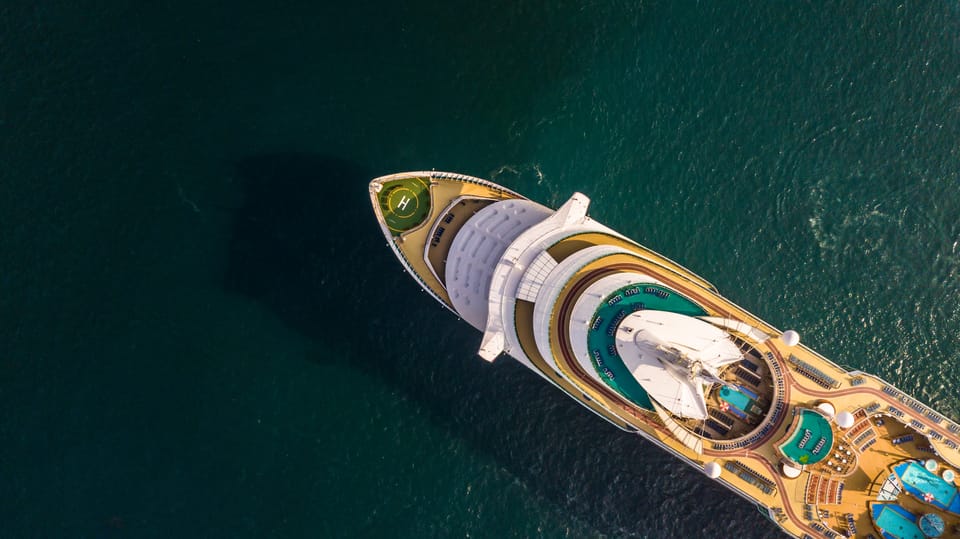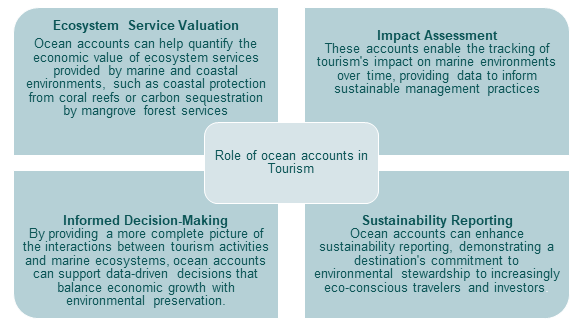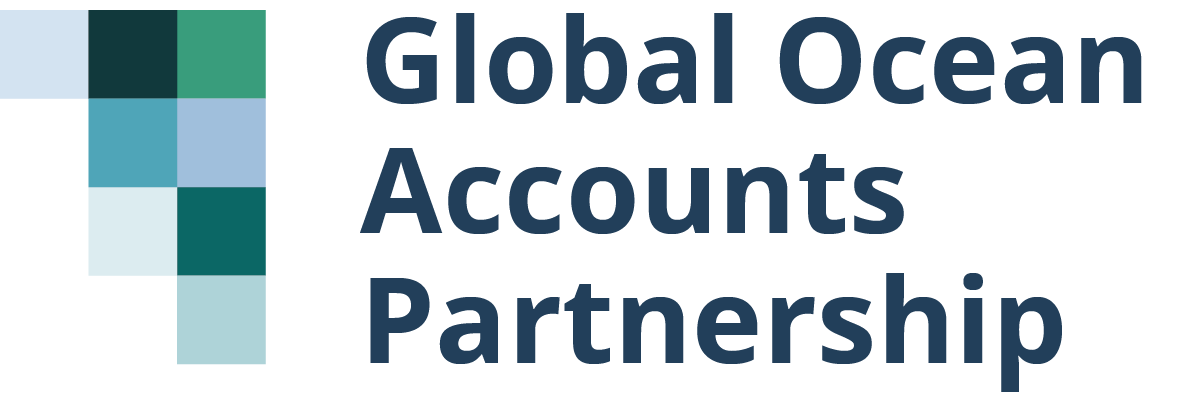Understanding the Impact: Using Ocean Accounts to Support Sustainable Coastal Tourism

Tourism is one of the fastest growing sectors in the world, contributing to 10% of global GDP and 1 in every 10 jobs worldwide, with approximately half of this activity concentrated in coastal and marine environments [1]. While economically important, it can place significant strain on local resources and ecosystems. Increased demand can lead to the degradation of natural habitats, heightened pollution, and the loss of essential ecosystem services provided by healthy marine environments, such as coral reefs and mangroves [1].
These adverse impacts are particularly significant for Small Island Developing States (SIDS), where tourism often represents the largest economic sector. In SIDS, tourism contributes approximately 30% of GDP on average—double the global figure [1]. This economic importance is further underscored by the fact that in 2019, SIDS earned $55 billion in exports from tourism and hosted 44 million international tourist arrivals, accounting for 3 percent of the global total [1]. Such heavy reliance on tourism not only drives economic growth but also makes these nations especially vulnerable to the sector's volatility and negative impacts, both environmental and social.
As the global community strives to balance economic growth with environmental sustainability, integrated ocean and tourism accounts have proven to be an effective approach for addressing these multifaceted challenges.
These accounts provide a comprehensive framework for understanding the economic, social, and environmental dimensions of tourism, helping countries develop more sustainable and inclusive tourism policies.
Accounting for sustainable tourism
Ocean accounts are integrated records of economic, social and environmental data related to marine and coastal areas. Ocean accounts offer a framework to quantify the economic value of marine ecosystems that often underpin coastal tourism. The implementation of ocean accounts in coastal tourism destinations can offer several key benefits, summarised in Figure 1.

For informed decision-making in tourism, policymakers need to grasp the overall economic contribution of the sector, including which components generate the most value and where these activities occur.
In coastal destinations, the natural environment plays a central role in attracting visitors. Many tourism activities in coastal areas are directly linked to environmental features, such as coral reefs for diving, beaches for leisure, or mangrove forests for eco-tours. Therefore, understanding how these tourism activities depend on and impact these natural assets is crucial. By considering both aspects together, decision-makers can evaluate the trade-offs between economic growth and environmental sustainability, leading to more balanced outcomes.
For example, a coastal nation using ocean accounts can go beyond measuring the direct economic impact of beach tourism to also quantify the economic value of supporting ecosystems like coral reefs or mangrove forests. Integrating economic and environmental data allows ocean accounts to address critical questions, such as: If an ecosystem were to recover in size or quality, how much would economic benefits increase? For instance, restoring a coral reef could boost fish populations, attract more diving tourism, and raise local incomes.
This integrated approach helps policymakers clearly see the link between environmental health and economic prosperity, enabling decisions that support both tourism growth and ecosystem conservation
The integration of ocean accounts with Tourism Satellite Accounts (TSAs) creates a powerful synergy. While TSAs provide detailed economic data on tourism's contribution to national economies, ocean accounts add crucial environmental and social dimensions. This combination allows for a more comprehensive understanding of tourism's full impact. For instance, it can help quantify how tourism-related employment and income (captured in TSAs) relate to changes in ecosystem health or community access to resources (measured in ocean accounts). This holistic view is essential for addressing social issues like community displacement or inequitable resource access.
TSAs capture a range of vital information, including the:
- Tourists arriving in a country (i.e., inbound tourism expenditure)
- Residents travelling abroad (i.e., domestic tourism expenditure)
- Economic impact of tourism on employment
- Tourism's contribution to Gross Domestic Product (GDP)
- Interrelationships between tourism and other economic sectors
Global outlook
Numerous countries, from the Bahamas to Indonesia, have implemented TSAs to inform policy decisions and guide investment strategies in their tourism sectors. These accounts have proven invaluable in demonstrating the economic importance of tourism and justifying public and private sector support for the industry.
As the global tourism industry continues to evolve, robust, data-driven management tools will be essential. Integrated ocean and tourism accounts provide a powerful solution for measuring, understanding, and managing the complexities of marine and coastal tourism. By providing a comprehensive view of tourism's economic value and environmental impacts, these accounts enable countries to develop evidence-based tourism management strategies that maximise economic benefits while balancing other national priorities.
The adoption of integrated ocean and tourism accounts represents a crucial step towards truly sustainable coastal tourism. By providing a comprehensive, data-driven foundation for decision-making, these accounts can help ensure that the economic benefits of tourism are balanced with environmental conservation and social equity. As we celebrate World Tourism Day, we call on policymakers, tourism operators, and coastal communities to embrace these integrated accounting approaches. Only by understanding the full picture of tourism's impacts can we create a future where coastal tourism contributes positively to local economies, communities, and ecosystems alike.
[1] Northop et al. 2021. Opportunities for Transforming Coastal and Marine Tourism: Towards Sustainability, Regeneration and Resilience.
Authors: Liz Hollaway and Jess Bridgland
